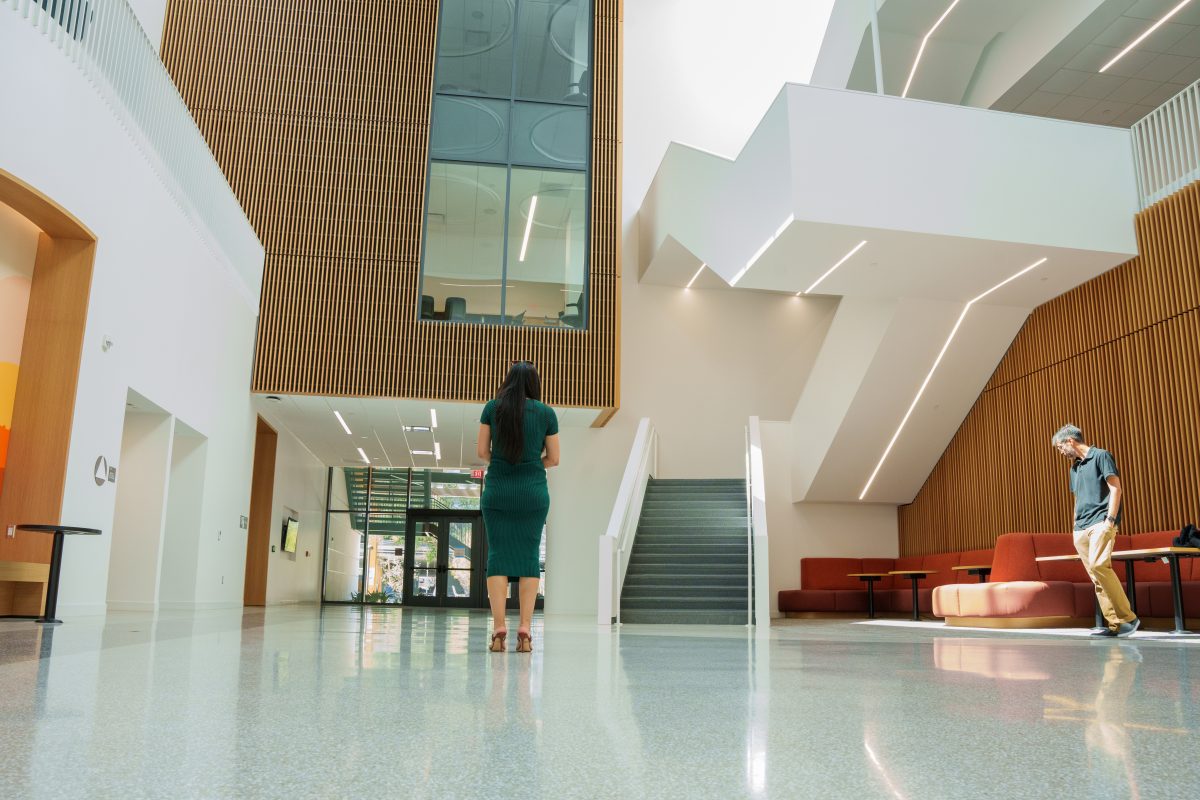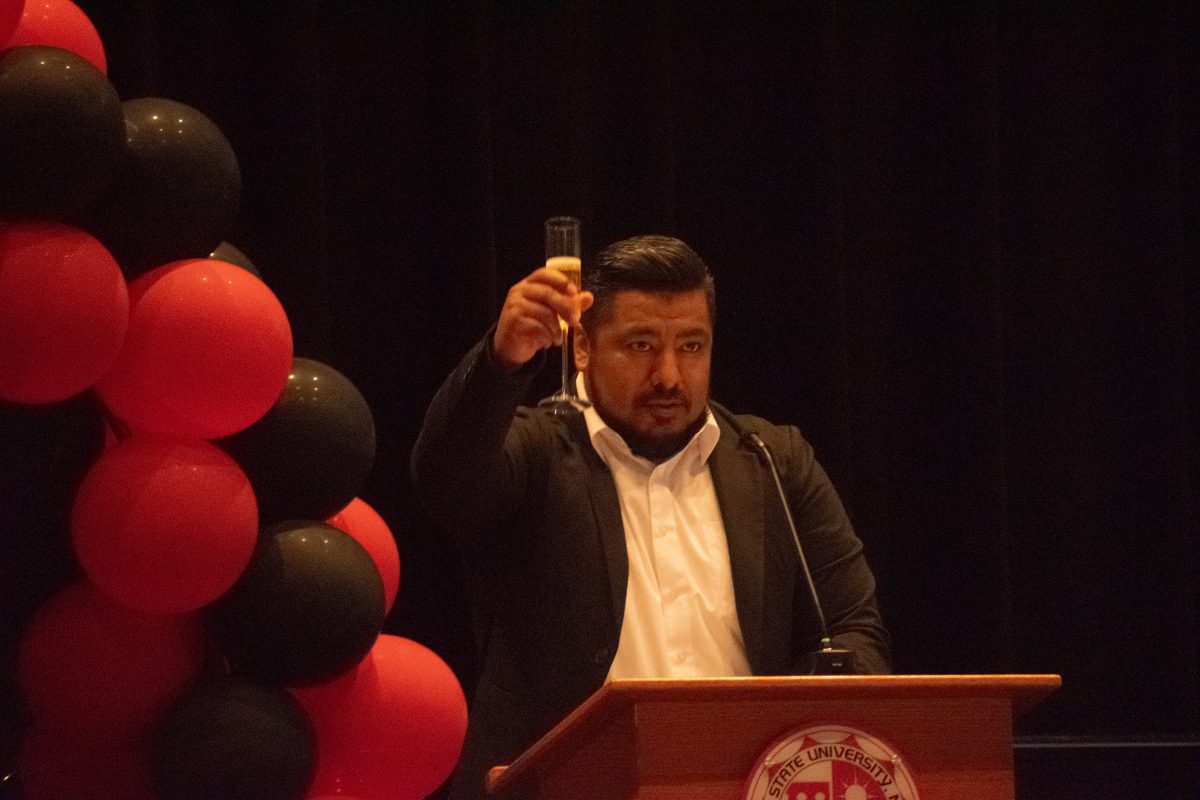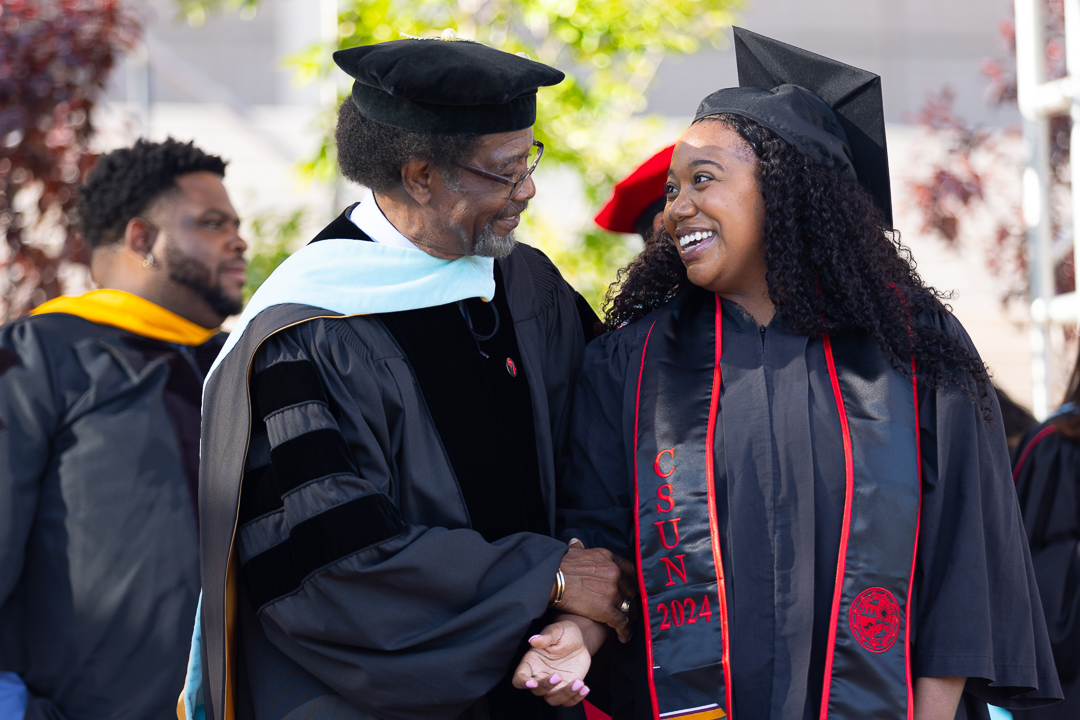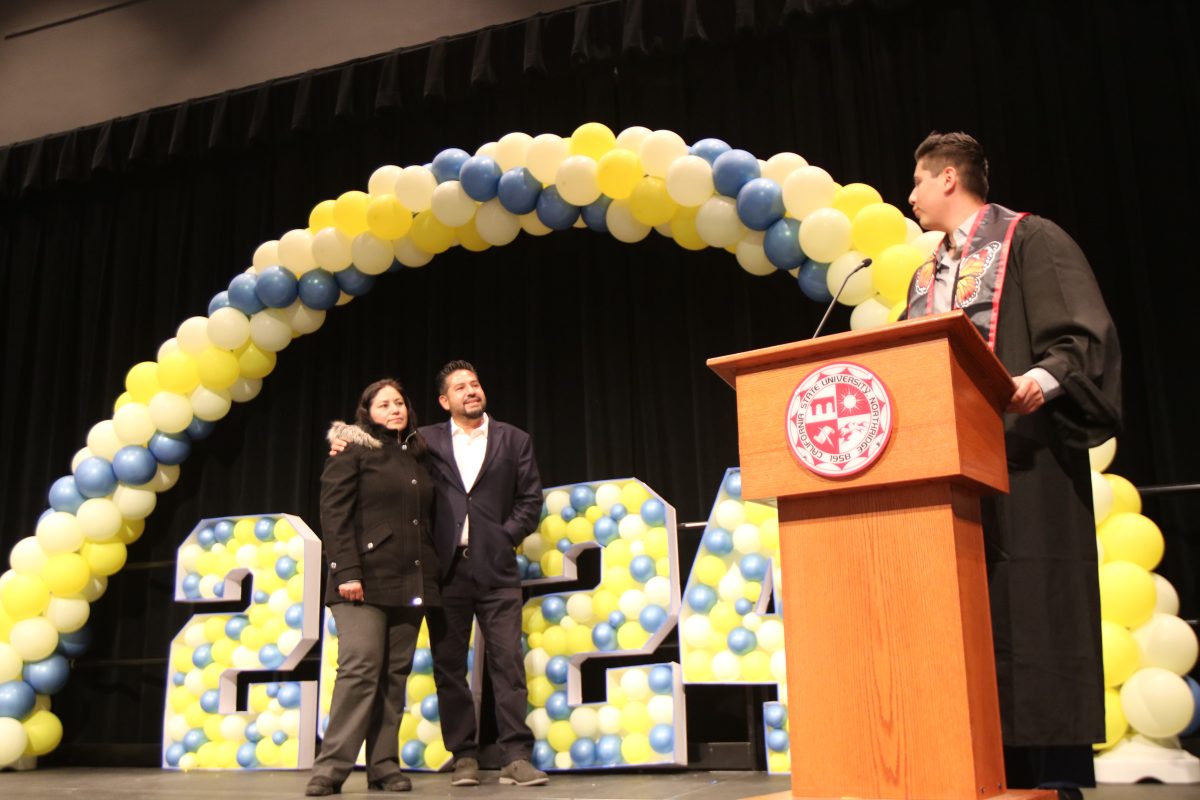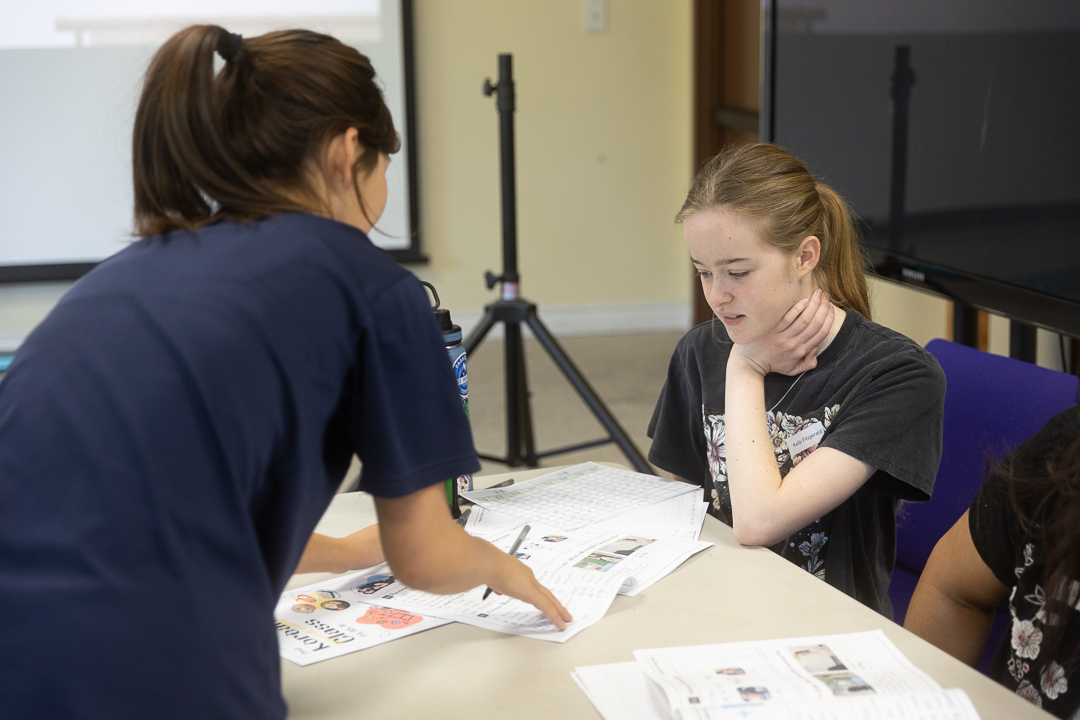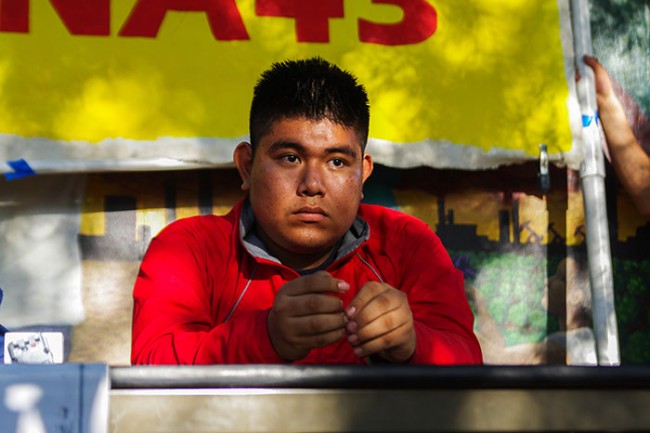
Angel Neri de la Cruz Ayala, a student at the Ayotzinapa school in Mexico was stopped and shot at by police during a protest.
Ayala he put his hands up after the buses were forced to stop and identified himself as a student before hearing shots fired.
He said he was scared after the first exchange with police because one of his friends had been injured. Ambulances arrived and took the injured, while some other students were arrested and taken away by police.
“We couldn’t believe the malice,” Ayala said, after seeing the damage to the bus that had received the most fire from police. “We tried to leave everything untouched because the police, before they left, they tried to collect all the bullets.”
At a presentation in Sequoia Hall and later at a press conference Thursday, March 19, Ayala gave his account of why the group was there September 26, how they came to have the buses and the responses they got from authorities.
Family and friends of the missing Ayotzinapa students came to CSUN on Thursday as part of the Caravana 43 con Ayotzinapa tour of the U.S. to speak about their experiences with the government in Mexico.
Blood was on the stairs and seats of the bus, he said, and it looked like one of the students had been shot point-blank.
Ayala waited for help, he said, trying to maintain the scene as journalists arrived but they were broken up by a different group of more militarized police later in the night and chased through the city. After trying to seek medical help for a friend and being forced out of a medical clinic, he took refuge in a warehouse, where he found other students and started a head count.
“They started taking our pictures and said ‘give us your real names because if you don’t, no one will ever find you,’” Ayala said.
After several hours, they discovered that 42 of their fellow first-year students were missing, along with one second-year student. Three students and three bystanders had been killed and several people had sustained injuries.
“All the investigations that have been done by the district attorney and at the federal investigation, they have all come to one word and one conclusion—nothing,” Ayala said, expressing that his story was only one of several parallel stories that occurred that night.
“If we allow this to happen and not bring it out to the public, it’s just that much easier for it to happen again and we don’t want that,” Ayala said.
He also related his story to police shootings in the U.S. saying to students that he “ feel[s] like you identify with us. Even if you just get harassed at a small level because of your skin color, you would understand.”
Faculty within the department had offered to translate throughout the event, helped frequently by bilingual audience members. Though most of his account was straightforward, Ayala’s composure broke when describing injuries received by his friends and the vulnerability he felt in the situation. The audience frequently snapped, clapped and cheered in support for the speakers.
“I know that what I’m telling you right now is long and tedious because of the translation” he said, trying to describe how the violence affected him.
Ayala asked that students leverage social networks to put pressure on the Mexican government to provide answers for the families of the missing students and show that President Enrique Peña Nieto was “not representative of Mexican people.”
Michelle Aranda, a Chicano studies major and a member of Movimiento Estudiantil Chicano de Atzlan (MEChA), said she felt the presentation gave her a more personal idea of events in Mexico that social media and news outlets had not portrayed.
“More students should be active and be conscious of these things happening in a country that’s very close to us,” Aranda said.
MEChA has raised $700 for Caravana 43 con Ayotzinapa, according to club member Janet Valenzuela. The group will use the money in their efforts to get independent investigators to analyze the evidence from the site of the mass grave where Mexican authorities reportedly found the remains of 28 of the missing students.
“They’re trying to reach justice and they demand to know where the students are, why did they do this, and to end corruption in low-funded communities,” Valenzuela said.
The group spoke in Sequoia Hall room 104 and gathered a crowd large enough to force the event to be split into two sessions, with audience members sitting in aisles and stairwells.
Karla Castañeda was the next to speak, telling students about her daughter, who went missing in 2008 and the hunger strike in which she participated in front of the Mexican consulate to demand the records of the investigation.
“The authorities aren’t going to do anything until you start doing something that will hurt them,” Castañeda said. “I don’t think it’s fair that what happened to the 43 students in Ayotzinapa had to happen for us to respond and for Mexico to respond to what is happening.”
The reply she has gotten from authorities, she said, was that nothing can be done or that her story is nothing more than a “black legend.”
“I hope the students of Ayotzinapa do not end up being another legend,” Castañeda said.
Nanci Cisneros was also travelling with the group and told about her experiences looking for her brother, one of the missing students.
“My brother was picked up by the police in Mexico and and when I got notice of this I went to Tijuana without clothes or anything to look for [him],” she said. “One year after, I took things into my own hands because the police weren’t doing anything.”
Cisneros intends to create a group whose goal would be to find people who have been deported from other countries, including Mexico.
“We still fight for the 2,700 people that have disappeared,” she said.
Cruz Bautista, a professor whose nephew, Benjamin Ascencio Bautista, is also one of the missing students, called the official story of their death “illogical.” Weather conditions and technological evidence contradict the assessment that the students could have been incinerated at the site, he said.
“We continue to refuse the version of the police because we believe that we can still find them,” Bautista said. “For them it is a cold case. We’re not ignorant of the fact that the government has technology that they refuse to use to find the students. We insist that the technology be used.”
Students were able to ask the speakers questions about how they could get involved and help the Ayotzinapa cause. The question was voiced by Cynthia Fajardo, president of the social work society, and greeted with cheers and applause by others in the crowd.
“I commend them for coming here and having bravery and fighting this fight,” Fajardo said. “It’s really hard for them to come here and try to explain this tragedy to people because we expect some kind of transparency from our cops. That transparency does not exist in Mexico.”
Ayala said that, as students, it was up to them to keep the movement alive.
“Never allow the powers that be to treat you the way we are treated back in Mexico,” Ayala said. “We are only 500 students in our school but we are the school that makes the state tremble. They fear us.”
Ayala said CSUN students must defend their civil liberties and those of other students by standing in solidarity with anyone whose rights had been violated because “one little minor aggression can lead to something greater.”
Caravana 43 con Ayotzinapa is also holding events on the 26th of every month and Ayala asked students to participate and stay involved in social media.
“If ever the president of Mexico comes here, treat him and receive him as the person that he is. He is a murderer,” Ayala said.
The group has also made headway with foreign governments, Ayala said, especially in Germany, where they have convinced German leaders not to sell arms to Mexico.
“We are humans and we have living rights that must be obeyed,” Bautista said. “The government has been violating these rights and we have come to organize and encourage others to organize so that this cannot happen here.”
He said the group hopes to have the same success with the American government.
“We want our human rights to be restored that were crushed that tragic day,” Ayala said. “We want all the students of the this country to come together and fight for their rights. We all have dreams. The 46 students that were assassinated had dreams. We are here to ask you not to leave us alone.”

